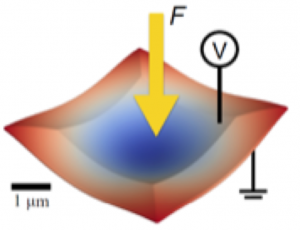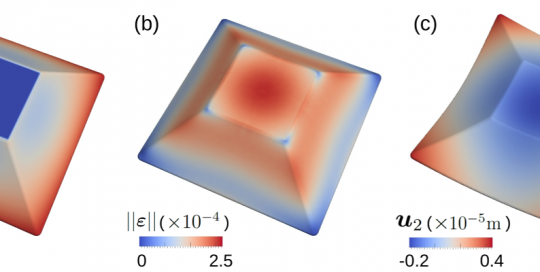
Piezoelectric materials transduce electrical voltage into mechanical strain and vice-versa, which makes them ubiquitous in sensors, actuators, and energy harvesting systems. Flexoelectricity is a related but different effect, by which electric polarization is coupled to strain gradients, i.e. it requires inhomogeneous deformation. Flexoelectricity is present in a much wider variety of materials, including non-polar dielectrics and polymers, but is only significant at small length-scales, where high strain-gradients develop. It has been suggested that flexoelectricity could enable piezoelectric metamaterials made out of non-piezoelectric components, including soft materials. This would significantly broaden the class of materials used for electro-mechanical transduction, which could enable affordable, biocompatible and self-powered small-scale devices.
Our main objective is to develop an advanced computational infrastructure to quantify flexoelectricity in solids, focusing on continuum models but also exploring multiscale aspects, in tight collaboration with experiment. We plan to explore the effects of strain gradients on the physics of dielectrics, identifying fundamental manifestations and extracting the underlying engineering principles for a new generation of electromechanical metamaterials
Selected Publications
- Mathematical models and efficient finite element methods for coupled systems of high-order partial differential equations
- Atomistic simulations of dielectrics under inhomogeneous deformations
- Effects of strain gradients on fracture physics of ferroelectrics
- Physics of ferroelectric domain walls
- Accurate models for electromechanical characterization of nanomaterials
- Electromechanical metamaterials
People
Projects

Enabling flexoelectric engineering through modeling and computation
Principal Investigator: Irene Arias
